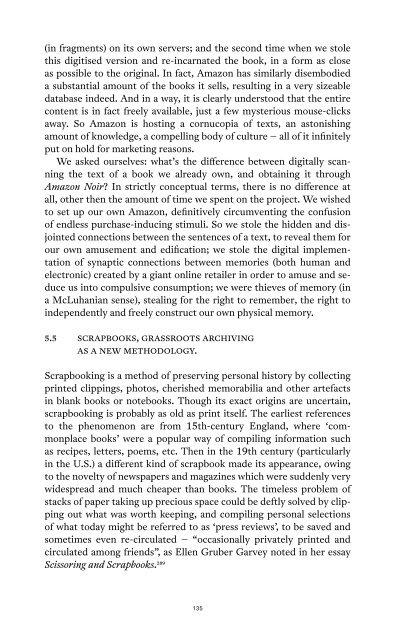Post- Digital Print - Monoskop
Post- Digital Print - Monoskop
Post- Digital Print - Monoskop
You also want an ePaper? Increase the reach of your titles
YUMPU automatically turns print PDFs into web optimized ePapers that Google loves.
(in fragments) on its own servers; and the second time when we stole<br />
this digitised version and re-incarnated the book, in a form as close<br />
as possible to the original. In fact, Amazon has similarly disembodied<br />
a substantial amount of the books it sells, resulting in a very sizeable<br />
database indeed. And in a way, it is clearly understood that the entire<br />
content is in fact freely available, just a few mysterious mouse-clicks<br />
away. So Amazon is hosting a cornucopia of texts, an astonishing<br />
amount of knowledge, a compelling body of culture – all of it infinitely<br />
put on hold for marketing reasons.<br />
We asked ourselves: what’s the difference between digitally scanning<br />
the text of a book we already own, and obtaining it through<br />
Amazon Noir? In strictly conceptual terms, there is no difference at<br />
all, other then the amount of time we spent on the project. We wished<br />
to set up our own Amazon, definitively circumventing the confusion<br />
of endless purchase-inducing stimuli. So we stole the hidden and disjointed<br />
connections between the sentences of a text, to reveal them for<br />
our own amusement and edification; we stole the digital implementation<br />
of synaptic connections between memories (both human and<br />
electronic) created by a giant online retailer in order to amuse and seduce<br />
us into compulsive consumption; we were thieves of memory (in<br />
a McLuhanian sense), stealing for the right to remember, the right to<br />
independently and freely construct our own physical memory.<br />
5.5 scrapbooks, grassroots archiving<br />
as a new methodology.<br />
Scrapbooking is a method of preserving personal history by collecting<br />
printed clippings, photos, cherished memorabilia and other artefacts<br />
in blank books or notebooks. Though its exact origins are uncertain,<br />
scrapbooking is probably as old as print itself. The earliest references<br />
to the phenomenon are from 15th-century England, where ‘commonplace<br />
books’ were a popular way of compiling information such<br />
as recipes, letters, poems, etc. Then in the 19th century (particularly<br />
in the U.S.) a different kind of scrapbook made its appearance, owing<br />
to the novelty of newspapers and magazines which were suddenly very<br />
widespread and much cheaper than books. The timeless problem of<br />
stacks of paper taking up precious space could be deftly solved by clipping<br />
out what was worth keeping, and compiling personal selections<br />
of what today might be referred to as ‘press reviews’, to be saved and<br />
sometimes even re-circulated – “occasionally privately printed and<br />
circulated among friends”, as Ellen Gruber Garvey noted in her essay<br />
Scissoring and Scrapbooks. 289<br />
135

















